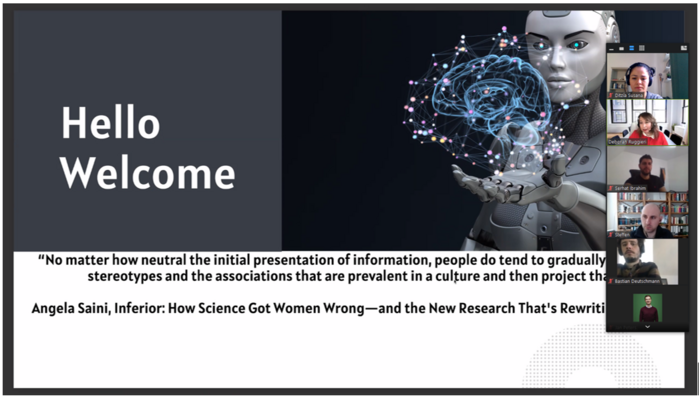The meeting of the PhD students for 2021 was organized on 8th and 9th March and was held entirely online. The formal introduction by the coordinating team was followed by a 4-hour workshop hosted by reputed cultural and political scientist Deborah Ruggieri, under the theme “Why gender matters in science: a beneficial approach”. An increasingly important topic in science and academia, gender equality has also become one of the most talked-about topics in academic circles in the recent past. It is therefore not only important to talk about it, but also important to give proper knowledge about it to future scientists. During the four hours of the workshop, a good understanding of what gender equality is in the context of academics and research groups was given to the participants and topics like why gender equality matters, and how it can increase productivity within the groups, and how to achieve it without losing sight of the big picture were also tackled.
The workshop was followed by a two-hour presentation session by individual research groups to give an update about their respective projects to their colleagues. This was done in the interest of keeping everyone updated about the current status of the projects and to encourage an exchange of ideas within the groups. Each group presented their work in a 10minute presentation, followed by a 10minute question and answer session.
On the second day of the meeting, three soft skill workshops were organized simultaneously, and the participants were given the chance to choose a workshop better suited to their interests. Two workshops were offered in English, under the themes “Presence and Impact”, and “Presenting to camera: becoming an effective and confident online presenter”, hosted by Kate Montague and Andrew Weale, senior consultants of Avocets consulting in London, UK. Both the workshops tackled the now crucial topic of handling oneself effectively in virtual environments and were well received by the participants. Both the workshops were highly interactive and gave the participants a chance to practise what they learnt and get feedback from their peers. The third workshop of the day was offered in German, under the theme “Communication skills for research assistants” and discussed about efficient communication, how important effective listening is for communication, and also gave the participants a chance to recognize the pros and cons of their communication strategies. Hosted by Dr Sarah Engelmann, a communication specialist, the workshop was also very interactive and was well received by the participants.
Originally planned to be held in person, the meeting had to be quickly adapted to an online platform, and yet with the gracious assistance of all the participants, it was a successful two days of exchanging ideas, learning new strategies and overall a good break from the laboratories.







